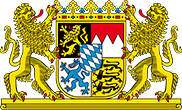Bavarian State Minister of Education, Science and the Arts, Dr. Spaenle, provides first insights into „Einschnitt“
The 1972 Munich Massacre Memorial is going to be officially opened to the public on Wednesday by Bavarian Prime Minister, Seehofer, the President of Germany, Steinmeier, the President of Israel, Rivlin, and Bavarian State Minister of Education, Science and the Arts, Spaenle
MUNICH. Bavarian State Minister of Education, Science and the Arts Dr. Ludwig Spaenle has invited journalists to a pre-opening information tour of the memorial site “Einschnitt” at Kolehmainenweg in Olympic Park Munich today. This memorial site commemorates the shocking massacre and attack on the Israeli Olympic team during the Summer Olympics in Munich 1972.
The memorial site is going to be officially opened to the public next Wednesday by: Bavarian Prime Minister, Horst Seehofer, the President of Germany, Frank-Walter Steinmeier, the President of Israel, Reuven Rivlin, and Bavarian State Minister of Education, Science and the Arts, Dr. Ludwig Spaenle. The President of the Landtag, Barbara Stamm, and Bavarian State Minister of the Interior, Joachim Herrmann, will also attend. A private commemoration of the victims is scheduled to take place before the ceremonial opening act. During this private event, the memorial site will be officially dedicated to the relatives of the eleven Israeli athletes and the Bavarian policeman, who were killed during the act of terrorism. The President of the Central Council of Jews in Germany, Dr. Josef Schuster, as well as the President of the Israelitische Kultusgemeinde München und Oberbayern, Charlotte Knobloch, the Mayor of Munich, Dieter Reiter, the President of the IOC, Thomas Bach, the CEO of the German Olympic Sports Confederation (DOSB), Michael Vesper, and Steven Ungerleider of the Foundation for Global Sports Development will also participate in the ceremony.
State Minister Spaenle said at the memorial site today: “The act of terrorism that struck the Israeli Olympic team at the Summer Olympics in Munich 1972 was and still is a painful “Einschnitt” (Engl. “deep wound”/”turning point”). It affected and still affects the lives of the athletes and their relatives. It disrupted the cheerful Summer Olympics in Munich. It was a blow to the concept of peaceful athletic competition of nations and remains an “Einschnitt” in recent German history. The memorial will commemorate the Israeli athletes and the Bavarian policeman, provide information on this act of terrorism and its historical context. We want to direct public attention to this tragedy and honour the personalities of the people who lost their lives. The concept of the memorial site is intended to show the stark contrast between cosmopolitan athletic competition according to the Olympic ideal on one side and the traumatizing open wound of the devastating act of terror on the other side. It’s the individuals and the story of the victims‘ lives that are the focus of the memorial. I take the opportunity to thank the architect’s office of Brückner & Brückner for making this visible with a symbolic open wound in the Olympic Park Munich.”
The history of the 1972 Munich Massacre
Eight members of the Palestinian terrorist organization “Black September Organization” invaded the Olympic Village on September 5th, 1972. They took eleven Israeli athletes hostage in Apartment 1 at Connollystraße 31. Two athletes tried to fight off the terrorists and were subsequently murdered at Connollystraße. German security authorities took the terrorists and the hostages to Fürstenfeldbruck, feigning agreement with the terrorists‘ request demanding transportation to Cairo. The remaining nine Israeli hostages and a Bavarian policeman were killed during an attempt to rescue the hostages at the Airport of Fürstenfeldbruck.
The victims of the 1972 Munich Massacre are:
David Berger
Ze’ev Friedmann
Yossef Gutfreund
Eliezer Halfin
Yossef Romano
Amitzur Shapira
Jacob Springer
Kehat Shorr
Mark Slavin
André Spitzer
Moshe Weinberg
and
Anton Fliegerbauer
“Einschnitt“ as a victorious concept of an architectural competition
Several architect’s offices handed in their concepts for a memorial site commemorating the 1972 Munich Massacre in an architecture competition in 2014. The conceptual guideline was developed by Werner Karg of the Bavarian Ministry of Education, Science and the Arts, Bernhard Purin of the Jewish Museum Munich and Dr. Jörg Skriebeleit of the memorial site at the former concentration camp Flossenbürg in agreement with the relatives of the victims and the General Consulate of Israel.
A jury presided over by Professor Barbara Holzer ultimately proclaimed the conceptual design “Einschnitt” by the architect’s office Brückner & Brückner from Tirschenreuth as the winner of the competition. The conceptual design was realized at the westward Lindenhügel at Olympic Park Munich, with the memorial site being cut into a hill at Kolehmainenweg and fitted with the biographies of the twelve victims as well as a multimedia-based presentation on the attack providing the historical context of the cheerful Summer Olympics and Palestinian terrorism. The political dimension of the Summer Olympics in general and the importance of the Summer Olympics of 1972 to the Federal Republic of Germany are centrepieces of the concept as well as information on the Israeli-Arabian conflict and Palestinian terrorism with the “Black September Organization”.
The Memorial Site
Expenditures for the memorial site of approx. 2.35 Million Euro (of which 1.9 Million Euro for the memorial site, approx. 450,000 Euro for the presentation) are shared between:
- the Free State of Bavaria,
- the Federal Republic of Germany,
- the capital of Bavaria, Munich,
- the International Olympic Committee,
- the German Olympic Sports Confederation (DOSB),
- the Foundation for Global Sports Development.
Additional information can be downloaded on www.km.bayern.de/pressematerial.
Dr. Ludwig Unger, Tel. 089-21862105
-

-

-

-

-

-

BAYERN | DIREKT:
Wir beantworten Ihre Anliegen gerne – telefonisch unter
089 12 22 20*oder per E-Mail an
direkt@bayern.deoder über das Kontaktformular
Montag bis Donnerstag von 08:00 bis 18:00 Uhr und Freitag von 08:00 bis 16:00 Uhr.


